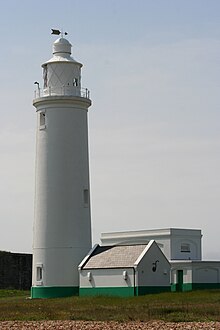Hurst Point Lighthouse

Hurst Point Lighthouse
|
|
|
Hampshire
|
|
| Location |
Hurst Spit Hampshire England |
|---|---|
| Coordinates | 50°42′28.7″N 1°33′1″W / 50.707972°N 1.55028°WCoordinates: 50°42′28.7″N 1°33′1″W / 50.707972°N 1.55028°W |
| Year first constructed | 1812 (first) |
| Year first lit | 1867 (current) |
| Automated | 1923 |
| Construction | masonry tower |
| Tower shape | cylindrical tower with balcony and lantern |
| Markings / pattern | white tower and lantern |
| Height | 26 m (85 ft) |
| Focal height | 23 m (75 ft) |
| Current lens | 1st order 920mm fixed lens |
| Intensity | white: 7,140 candela red: 1,760 candela |
| Range | white: 13 nmi (24 km) red: 10 nmi (19 km) |
| Characteristic | Fl (4) WR 15s. F WRG at 19 metres (62 ft) |
| Admiralty number | A0538.1 |
| NGA number | 0596 |
| ARLHS number | ENG 057 |
| Managing agent | Trinity House |
Hurst Point Lighthouse is located at Hurst Point in the English county of Hampshire, and guides vessels through the western approaches to the Solent.
The original lighthouse was the Hurst Tower, sited to the south west of the old Hurst Castle and lit for the first time on 29 September 1786.Joseph Huddart supervised and directed its construction. However, this light was found to be obscured from certain directions; consequently, in 1812, this tower was supplemented by the High Lighthouse, a new tower at a higher level.
In light of the expansion of the Castle between 1865 and 1873, it proved necessary to reposition the lights. In 1866, the Low Light - a white circular granite tower with a red lantern - was built to replace the Hurst Tower. In 1911, this light was itself replaced with a red square metal tower, standing on steel joists attached to the Castle wall. It has since been decommissioned, but both of these Low Lights remain in place, the former painted grey and the latter blue/battleship grey to camouflage them and prevent confusion for mariners.
Meanwhile, in 1867, the 1812 High Lighthouse was replaced by the freestanding 26 metre tower built on the end of Hurst Spit, and which is still working today. It is open for visitors, but cannot be reached by car; access is by foot or boat only.
...
Wikipedia

